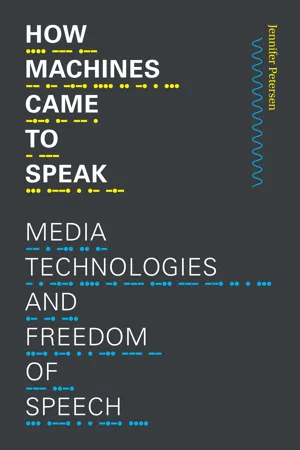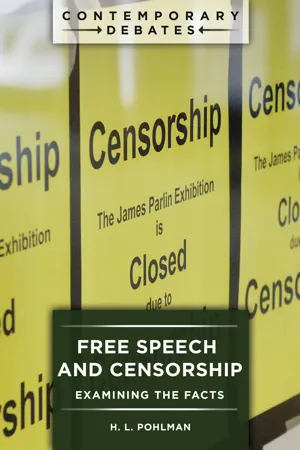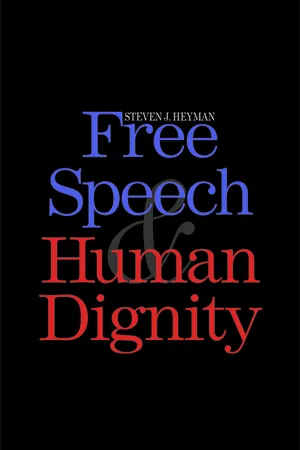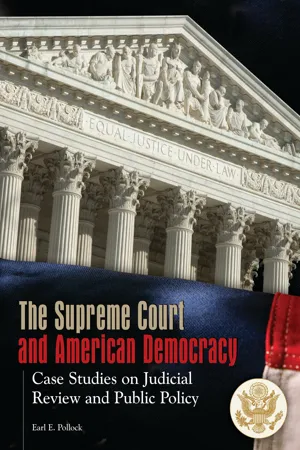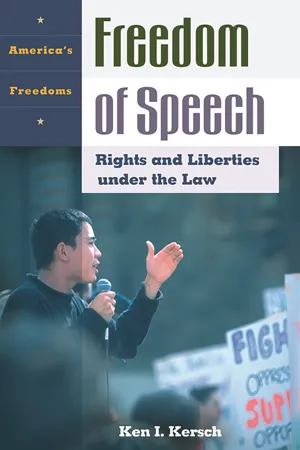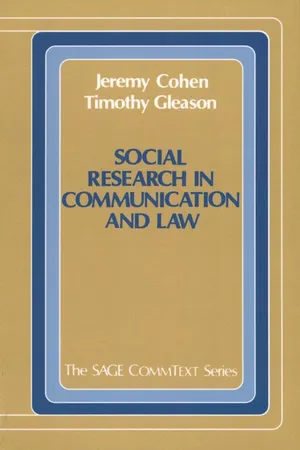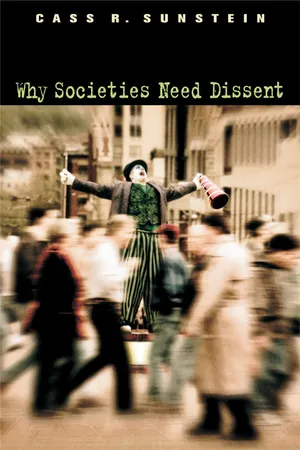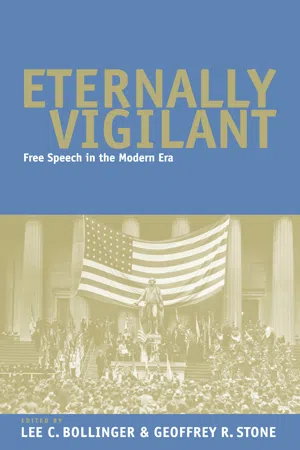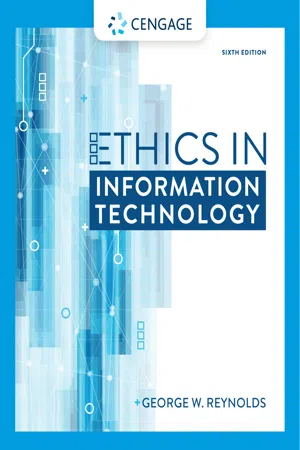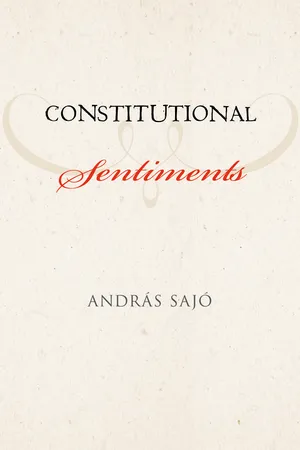Law
Freedom of Speech in the US
Freedom of speech in the US refers to the constitutional right to express opinions and ideas without government interference or censorship. This fundamental right is protected by the First Amendment of the US Constitution and encompasses a wide range of expressive activities, including speech, press, assembly, and petition. However, certain limitations exist, such as speech that incites violence or poses a clear and present danger.
Written by Perlego with AI-assistance
Related key terms
1 of 5
10 Key excerpts on "Freedom of Speech in the US"
- eBook - PDF
How Machines Came to Speak
Media Technologies and Freedom of Speech
- Jennifer Petersen(Author)
- 2022(Publication Date)
- Duke University Press Books(Publisher)
Introduction The “Speech” in Freedom of Speech Congress shall make no law respecting an establishment of religion, or prohibiting the free exercise thereof; or abridg-ing the freedom of speech, or of the press ; or the right of the people peaceably to assemble, and to petition the Govern-ment for a redress of grievances. — First Amendment, US Bill of Rights The First Amendment that most Americans hold dear is an invention of the twentieth century. But what was behind this invention? The conven-tional explanation is that the set of expressive freedoms we know as free speech — the right to speak one’s mind in a public space, to engage in offen-sive and dissenting speech or gesture, to craft aesthetic expressions of our inner states or selves — was forged through social movements and changes in political culture and legal thought. These histories are concerned primar-ily with the boundaries and purpose of democratic communication (e.g., the various normative bases or “theories” of free speech in legal theory) or shifts in social and moral parameters of the law (e.g., what is obscene)— in other words, they focus on the “free” in free speech. But the very concep-tion of what constitutes expression — or the “speech” in free speech — has also changed during this period. At the dawn of the twentieth century, the “speech” of free speech referred to oratory and printed material. It was a narrow category populated by public speakers, pamphleteers, authors, and publishers. A plethora of activities that we would consider expressive, eli-gible for First Amendment protection today, would not have made sense as speech to early twentieth-century legal practitioners. Activities such as 2 INTRODUCTION burning flags, naked dancing, wearing symbols (such as black armbands), producing and displaying abstract art, or sitting in silent protest would not have been considered relevant to the First Amendment. - eBook - ePub
Free Speech and Censorship
Examining the Facts
- H. L. Pohlman(Author)
- 2019(Publication Date)
- ABC-CLIO(Publisher)
1 Basic Principles of Free Speech The First Amendment of the U.S. Constitution includes the constitutional right of freedom of speech. The amendment reads as follows:Congress shall make no law respecting an establishment of religion, or prohibiting the free exercise thereof; or abridging the freedom of speech, or of the press, or the right of the people peaceably to assemble, and to petition the Government for a redress of grievances.The inclusion of freedom of speech in the “First” Amendment is an implicit acknowledgment of the importance of free speech for the U.S. system of government and for American society in general. The meaning of this constitutional right has evolved over the course of American history. It began primarily as a fairly narrow right prohibiting the government from imposing “prior restraints” on publishers. “Prior restraints” were laws that prevented anyone from engaging in publication without a government license. Understood in this way, free speech did not prevent the government from punishing someone for what was published. However, early in the nation’s history, in reaction to the Alien and Sedition Acts of 1798, many Americans interpreted free speech to preclude the government from punishing “seditious libel,” which was generally defined as any publication that encouraged disrespect of governmental institutions, the law, or public officials. Following the election of 1800, President Thomas Jefferson pardoned those still serving sentences under the Sedition Act, and Congress repaid all fines levied under it. These actions buttressed the emerging view that freedom of speech prohibited not only prior restraints but also the punishment of speech critical of the government or public officials.Over the course of the next two centuries, the Supreme Court deepened and expanded the right of free speech. It did so in part by expounding on “basic principles” of free speech. These “basic principles” focus on the why , the what , the who , and the when : Why is free speech a “fundamental” constitutional right? What does this right protect? Who has this constitutional right? When does this right provide protection? What limits does free speech place on governmental actions? What - eBook - PDF
- Steven J. Heyman(Author)
- 2008(Publication Date)
- Yale University Press(Publisher)
47 4 Free Speech in a Framework of Rights In the previous chapter, I outlined some of the main ideas of a rights-based or liberal humanist approach to the First Amendment. My goal in the next two chapters is to develop those ideas into a general theory of the founda-tions and limits of freedom of expression. On this view, rights reflect what it means for human beings to be free in different areas of life, including (1) the external world; (2) the internal domain of thought and feeling; (3) the politi-cal, social, and cultural life of the community; and (4) the intellectual and spiritual realm. These four elements correspond to the major justifications that have been advanced for freedom of speech and thought: that they are instances of external freedom in general; that they are essential for individual self-realization; that they are central to democratic self-government; and that they are necessary for the pursuit of truth. At the same time, these four ele-ments give rise to other individual and collective rights that are also entitled to protection under the law. In this way, we can view freedom of speech and thought as existing within a broader framework of rights based on respect for human dignity and autonomy—a framework that not only justifies the liber-ties protected by the First Amendment, but also enables us to identify their limits. ∞ 48 Rights-Based Theory of the First Amendment Free Speech and External Rights Our ideas of freedom and dignity begin with what it means to be a free person in the external world. This leads to the first category of fundamental rights. Individuals have a right to life and, more broadly, to personal security, or the right to control one’s own mind and body, free from violence or inter-ference by others. This power over oneself includes the freedom to direct one’s outward actions and movements without constraint. Finally, to live and act in the world, individuals must have some control over external things. - eBook - PDF
The Supreme Court and American Democracy
Case Studies on Judicial Review and Public Policy
- Earl Pollock(Author)
- 2008(Publication Date)
- Greenwood(Publisher)
. . [the Court has] never suggested that expression about philosophical, social, artistic, economic, literary, or ethical mat- ters—to take a nonexclusive list of labels—is not entitled to full First Amendment pro- tection.” Abood v. Detroit Board of Education, 431 U.S. 209, 211 (1977). Freedom of Speech Overview Although the wording of the First Amendment (“Congress shall make no law . . . abridging the freedom of speech.”) expressly applies only to Congress, the Amend- ment’s guarantees have been held to be “incorporated” in the Due Process Clause of the Fourteenth Amendment and are thus equally applicable to the States. (See com- ment “‘Incorporation’ of Rights in Due Process” in Chapter 6.) The First Amendment is stated in absolute terms (“shall make no law”), but it has never been construed to bar every regulation that might be said to involve some form 182 The Supreme Court and American Democracy 2 See Stone, Perilous Times: Free Speech in Wartime, at 25–76. of “speech.” Examples of speech unprotected by the Amendment include perjury, brib- ery, and obscenity. Another category of speech traditionally unprotected by the amendment is speech that advocates or incites violence or other illegal action. But in Brandenburg v. Ohio, the next digested case, the Court sharply narrowed this category, holding that government cannot “forbid or proscribe advocacy of the use of force or of law viola- tion except where such advocacy is directed to inciting or producing imminent lawless action and is likely to incite or produce such action.” (Italics added.) The core of freedom of speech, as the Court has frequently declared, is that government cannot regulate speech based on its content—its subject matter, its mes- sage, its ideas, its viewpoint. - eBook - PDF
Freedom of Speech
Rights and Liberties under the Law
- Ken I. Kersch(Author)
- 2003(Publication Date)
- ABC-CLIO(Publisher)
1990. The First Amendment, Democracy, and Romance. Cambridge, MA: Harvard University Press. Smolla, Rodney. 1992. Free Speech in an Open Society. New York: Knopf. Sullivan, Kathleen M., and Gerald Gunther. 1999. First Amendment Law. New York: Foundation Press. Sunstein, Cass. 1993. Democracy and the Problem of Free Speech. New York: Free Press. Tocqueville, Alexis de. [1833] 1969. Democracy in America. Ed. J. P. Mayer. Trans. George Lawrence. New York: Perennial Library. Trollope, Frances. [1832] 1960. Domestic Manners of the Americans. New York: Vintage Books. Page 39 Volokh, Eugene. 1995. “How Harassment Law Restricts Free Speech.” Rutgers Law Review 47: 561–578. White, G. Edward. 1996. “The First Amendment Comes of Age.” Michigan Law Review 95: 299–392. Page 40 This page intentionally left blank Page 41 2 Origins and Early Development FOR AMERICANS TODAY, freedom of speech is a constitutionally protected personal liberty, a fundamental and selfevident right of each of us. But the idea of a right to “freedom of speech” did not originally entail a personal right available equally to everyone. How, after all, could society function and sustain itself in a chaotic freefor all in which authority figures could be criticized and mocked and in which animosities between individuals and factions could be stirred and inflamed? The idea that ordinary individuals had a right to free speech, though perhaps not beyond imagining, was a marginal idea for much of the AngloAmerican legal tradition. Does this mean that in earlier periods of AngloAmerican legal history, ordinary people believed they had no general immunity from prosecution for what they said? Not completely. For centuries, people had demanded a right to speak freely, chiefly to pray and to praise God as they saw fit. Other than that, though, they kept a careful lid on their public utterances. Failure to do so, they knew, could lead them into serious trouble. - eBook - PDF
- Jeremy Cohen, Timothy Gleason(Authors)
- 1990(Publication Date)
- SAGE Publications, Inc(Publisher)
As the Ayatollah Ruholla Khomeini's call for the death of author Salman Rushdie because of his book, The Satanic Verses, and the subsequent controversy in the Islam and western worlds demonstrated, the meaning of freedom of the press is bound by political and cultural contexts. 2 54 THEORIES OF FREEDOM OF EXPRESSION 55 Protections of freedom of the press found in the First Amendment and in state constitutions are broadly worded texts with little definitional value. The First Amendment says, Congress shall make no law abridging . . . freedom of speech, or of the press. Only two states, Hawaii and South Carolina, have constitutional free press clauses with language that parallels the First Amendment. Thirty-nine state constitutions have free press provisions which qualify the right with a statement of responsibility. For example, Article 1, Section 8 of the Oregon Constitution reads, No law shall be passed restraining the free expression of opinion or restricting the right to speak, write or print freely on any subject whatsoever: But every person shall be responsi-ble for the abuse of this right. The federal and state constitutions establish rights to freedom of ex-pression, but the texts do not define the limits of constitutional protection. The general thrust of both the First Amendment and state constitutional speech and press clauses are similar, but some state supreme courts have interpreted state clauses as providing more protection for expression. 3 The Oregon Supreme Court has been one of the leaders in the use of the state constitution. The question of constitutional protection of obscene speech in Oregon provides one of the starkest examples of the indetermi-nacy of constitutional texts. - eBook - PDF
- Cass R. Sunstein(Author)
- 2005(Publication Date)
- Harvard University Press(Publisher)
5 F R E E S P E E C H Freedom of speech provides the key safe g uard a g ainst senseless cascades. It opens up space for dissent by forbiddin g g overnment from man-datin g conformity or from insulatin g itself, and citizens g enerally, from disa g reeable, unwanted, and even offensive opinions—from what Justice Oliver Wendell Holmes called “expression we loathe and believe to be frau g ht with death.” 1 A system of free expression increases the likelihood that when g roups and societies move in some direction, it is for g ood reasons. In ur g in g protection of speech, Holmes was himself a dissenter. But ultimately, and in a testimonial to the very position for which he was ar g uin g , his dissentin g opinion became the law of the land. Holmes’s position was endorsed in the Supreme Court’s g reatest free speech opinion, written durin g World War II. 2 There, the Court took the free speech principle seriously enou g h to strike down a state law requirin g children to salute the American fla g . It is worth pausin g over the coura g eousness of the Court’s decision, issued when the future of democracy itself was at stake. With its eye directly on America’s Fascist adversaries, the Court explained: “Compulsory unification of opinion achieves only the unanimity of the g raveyard.” In its most famous sentence, the Court added, “If there is any fixed star in our constitutional constellation, it is that no official, hi g h or petty, can prescribe what shall be orthodox in 96 ■ politics, nationalism, reli g ion, or other matters of opinion or force citizens to confess by word or at their faith therein. If there are any circumstances which permit an exception, they do not now occur to us.” If we are alert to the risks of conformity and cascades, we will readily see that the prohibition on official orthodoxy protects pub-lic purposes, not only private ones. It does this by reducin g the like-lihood of blunders by g overnment itself. - eBook - ePub
Eternally Vigilant
Free Speech in the Modern Era
- Lee C. Bollinger, Geoffrey R. Stone, Lee C. Bollinger, Geoffrey R. Stone(Authors)
- 2018(Publication Date)
- University of Chicago Press(Publisher)
In fact, however, the command theory simply cannot account for the constitutional law of freedom of speech today. Neither the text nor the original understandings provide much support for the principles of free expression that we today take for granted. Those principles are, instead, the product of an evolutionary process that follows—with some significant qualifications—the common-law approach. In a sense it is almost misleading to speak of “the First Amendment” as a description of the law governing freedom of speech in the United States. Formally, the textual basis for that law, in the Constitution, is of course the First Amendment. But the central principles that protect free expression in the United States were not established by the addition of the First Amendment to the Constitution in 1791. Those principles were developed more gradually, over an extended and relatively recent period.The Central PrinciplesWhat are those central principles? The constitutional law governing freedom of expression is elaborate and complex, but it is possible to identify three principles that give that body of law its essential structure.The first principle, and the one that radiates throughout the rest of the doctrine, is the importance of protecting the right to criticize the government. This was what the Supreme Court, in New York Times v. Sullivan ,8 identified as “the central meaning of the First Amendment”: the government may not punish people for criticizing it or its officials.9 The three most important First Amendment cases of the last half-century all concerned this principle, and together they dramatically confirmed its priority. New York Times v. Sullivan itself, decided in 1964, established sharp limits on the extent to which individuals could be held liable for civil damages for defaming a public official. In Brandenburg v. Ohio ,10 the Supreme Court said that “advocacy of the use of force or of law violation” cannot be made illegal “except where such advocacy is directed to inciting or producing imminent lawless action and is likely to produce such action”11 —a standard that may not be entirely clear in its particulars12 but that is plainly highly protective of dissident speakers who urge the violation of law. Finally, in New York Times Co. v. United States ,13 a majority of the Supreme Court agreed that the government would have to make a showing of extraordinary necessity (that a publication “will surely result in direct, immediate, and irreparable damage to our Nation or its people”)14 - eBook - PDF
- George Reynolds(Author)
- 2018(Publication Date)
- Cengage Learning EMEA(Publisher)
Several citizens have taken to writing strongly worded anonymous letters to the local newspaper voicing their dis-agreement over your candidate ’ s actions in her initial term as mayor. The campaign manager has suggested that you file John Doe lawsuits against the most vocal complainers as a warning to others of what they can expect if they are too vocal in their disagreement with the mayor. The goal is to intimidate others who might be inclined to write negative letters to the newspaper. Do you think this tactic will be successful? Why or why not? Freedom of Expression 207 Copyright 2019 Cengage Learning. All Rights Reserved. May not be copied, scanned, or duplicated, in whole or in part. Due to electronic rights, some third party content may be suppressed from the eBook and/or eChapter(s). Editorial review has deemed that any suppressed content does not materially affect the overall learning experience. Cengage Learning reserves the right to remove additional content at any time if subsequent rights restrictions require it. Summary What is the basis for the protection of freedom of expression in the United States, and what types of expressions are not protected under the law? • The First Amendment protects Americans ’ rights to freedom of religion, freedom of expres-sion, and freedom to assemble peaceably. The Supreme Court has ruled that the First Amendment also protects the right to speak anonymously. • Obscene speech, defamation, incitement of panic, incitement to crime, “ fighting words, ” and sedition are not protected by the First Amendment and may be forbidden by the government. What are some key federal laws that affect online freedom of expression, and how do they impact organizations? • Although there are clear and convincing arguments to support freedom of speech on the Internet, the issue is complicated by the ease with which children can use the Internet to gain access to material that many parents and others feel is inappropriate for children. - eBook - PDF
- Wayne A. Meeks(Author)
- 1992(Publication Date)
- Yale University Press(Publisher)
It is simply not true that social concepts of the sacrilegious or what constitutes an offense to honor, and the emotional reactions underlying or associated with these concepts are natural and stable. They have changed through time, with law playing some role in the shift. The perception of attacks on personal honor may change with every new generation. Once 229 FREEDOM TO EXPRESS WHAT? law successfully rejected that there is libel in false fact-based defamation of politicians, the general public no longer considered some of the offenses emotionally relevant. Profanity also was on the way to disappearance, both in the United States and in Europe, among other places, because in the public perception less and less is it rated as shocking. Normalization matters for emotions. Emotions, of course, continue to operate in the communication sphere, but the categories that trigger them change as well as the display rules. Freedom of speech expands in a sphere that is emotionally less loaded, for example in academia. Once on its path, speech continues to expand its sphere of influence to spheres of communication where emotions were more able to hamper reason-ing and the consideration of counterarguments. But all the time, behind the general theory of robust speech-protection and rational discourse paradigm there is an ongoing negotiation with emotional reactions that shape the understanding, interpreting, and evaluating of those communi-cations. There is no unidirectional progress here toward uncompromised rational speech, and temporary intensification of emotional reactions and their social evaluation changes the equations. The current revival of religious sensitivity has already rewritten certain rules of communication with potentially restrictive implication for the legal protection of freedom of speech. Constitutional law has a built-in mechanism for bringing in certain dictates of emotions.
Index pages curate the most relevant extracts from our library of academic textbooks. They’ve been created using an in-house natural language model (NLM), each adding context and meaning to key research topics.
